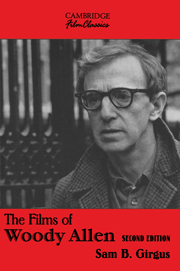Book contents
- Frontmatter
- Contents
- Acknowledgments
- Introduction to the Second Edition – The Prisoner of Aura: The Lost World of Woody Allen
- 1 Reconstruction and Revision in Woody Allen's Films
- 2 Desire and Narrativity in Annie Hall
- 3 Manhattan
- 4 The Purple Rose of Cairo – Poststructural Anxiety Comes to New Jersey
- 5 Hannah and Her Sisters
- 6 The Eyes of God
- Conclusion to the Second Edition – Allen's Fall: Mind, Morals, and Meaning in Deconstructing Harry
- Filmography
- Selected bibliography
- Index
1 - Reconstruction and Revision in Woody Allen's Films
Published online by Cambridge University Press: 14 January 2010
- Frontmatter
- Contents
- Acknowledgments
- Introduction to the Second Edition – The Prisoner of Aura: The Lost World of Woody Allen
- 1 Reconstruction and Revision in Woody Allen's Films
- 2 Desire and Narrativity in Annie Hall
- 3 Manhattan
- 4 The Purple Rose of Cairo – Poststructural Anxiety Comes to New Jersey
- 5 Hannah and Her Sisters
- 6 The Eyes of God
- Conclusion to the Second Edition – Allen's Fall: Mind, Morals, and Meaning in Deconstructing Harry
- Filmography
- Selected bibliography
- Index
Summary
Vincent Canby consistently hailed him as our most important comedic director. Pauline Kael regularly assailed him as predictable and self-indulgent. Other critics such as Terrence Rafferty sometimes express disappointment over his efforts, but still acknowledge the special quality and character of his work. To both the popular press and serious students of cinema, Woody Allen remains an eccentric and enigmatic genius who works ceaselessly as an innovative artist in an industry and medium dominated by commercial interests and mass tastes. Moreover, other directors imitate him in ways that suggest Allen's elevation as an influence and a force among that special group of critics, one's peers. For example, Rob Reiner promoted one of his own films as a kind of tribute to Allen's unique style, whereas Spike Lee's narrative voice and innovative directing often reflect Allen's work.
Because he is a celebrity and part of a world of mass entertainment, Allen's true artistic achievement and significance often have been minimized. This is unfortunate because Allen's work should be studied with the same close attention given to other serious artists and writers. While books about Allen and his work have accumulated steadily over the years, detailed studies of the artistry of the individual films have appeared only recently. On the cutting edge of contemporary critical and cultural consciousness, Allen challenges most of our traditional notions of authorship, narrative, perspective, character development, theme, ideology, gender construction, and sexuality.
- Type
- Chapter
- Information
- The Films of Woody Allen , pp. 20 - 43Publisher: Cambridge University PressPrint publication year: 2002



